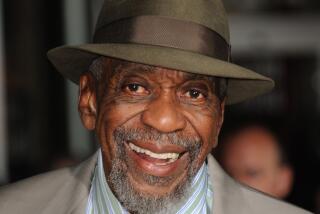Ron Bishop, 66; War Hero, TV Western Scriptwriter
- Share via
Ron Bishop, a maverick war hero, outdoorsman and conservationist widely praised in the television world for the authentic and symbolistic writing he brought to dozens of episodic Westerns, has died.
He was 66 and his daughter, Roni, said the one-time professional athlete had died Saturday at a Santa Monica hospital of the complications of a stroke. His wife, Pat, and two other daughters were with him when he died, she added.
A local boy who captured the state junior skiing championship while still attending Beverly Hills High School, Bishop was a descendant of Samuel Bishop, a cattle drover who founded the desert town named for him. War interrupted Bishop’s schooling at Stanford University, but not as he had intended. He had tried to enlist in the American military but was turned down because of a heart condition brought on by rheumatic fever.
Awarded Medals
Bishop turned to the American Field Service and was driving an ambulance with British 8th Army forces when they pushed into the Burma theater. He was taken out of the ambulance and put in charge of a platoon of Gurkhas and his efforts in battle brought him both the Order of the British Empire and the British Empire medal.
The 6-foot-3, 230-pound Bishop returned to Stanford and became a three-letter athlete in soccer, rugby and crew and then turned briefly to professional football with the San Francisco 49ers of the old All-American Football Conference.
By then he had married and developed an interest in writing that had not yet produced any income. To support his family he wrestled professionally, worked as a stevedore in San Francisco and a lumberjack in Oregon. And then he sold the first of what would prove dozens of television scripts: a 1958 episode of “Reckless Gun.”
In a writing career limited only by his failing health in recent years he was to be nominated for an Emmy for his work on “The Red Pony” in 1972-73 and came to be known to such authorities as “Gunsmoke” producer John Mantley as “perhaps the most unique writer in television today” (a quote Mantley offered in connection with a 1975 Times interview with Bishop).
Homilies in Scripts
Bishop sprinkled brief homilies throughout his scripts for “How the West Was Won,” “The New Land,” “Streets of San Francisco,” “Kung Fu,” “Maverick” and “Gunsmoke.”
“Don’t lie. Don’t quit,” his characters would say. Or “genuine courage . . . is a way of living. It is a way of resisting common inequalities. And fears.”
Often they were put in the mouths of 19th-Century men moving into an age for which their independence had ill-prepared them.
He wrote by choice of the Old West, saying, “It’s easier to go with a period piece than a contemporary piece because you don’t get a lot of people yelling at you . . . over a contemporary theme that might be subject to contention and (then) you get a whole bunch of letters coming in.”
He also became a strong conservationist and was a trustee of the Buffalo Bill Historical Center in Cody, Wyo., and member of the Boone and Crockett Club, named for the pioneers Daniel and Davy.
Martial Arts Expert
He was holder of a black belt in karate and an expert in judo, teaching both as an avocation. His writing extended to magazines--Atlantic, True, Harpers, Vogue, Field & Stream and more.
He spent as much time as his work permitted in Wyoming, where his daughter said he found the physical dimensions of the land matched his own enthusiasm for the outdoors. And he espoused a philosophy more suited to his Western characters than to his own time.
“People must have something strong to strive for,” he said in the 1975 interview. “This country wasn’t built on soda pop.”
His family asks contributions in his memory be sent to the Buffalo Bill center in Cody.
More to Read
The complete guide to home viewing
Get Screen Gab for everything about the TV shows and streaming movies everyone’s talking about.
You may occasionally receive promotional content from the Los Angeles Times.






